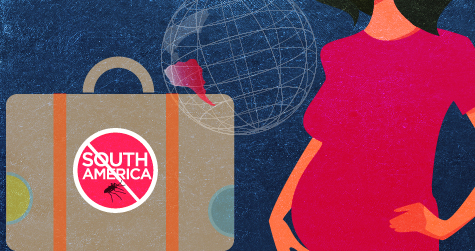Zika virus: Facts you need to know
The Zika virus can affect pregnant women, so be clear on what you need to know
Here we sort the fact from the fiction on the Zika virus giving you the information you need to know.

The virus can occur in the womb or in newborns, therefore pregnant women or women trying to conceive have been advised to avoid areas where cases of the virus have been reported.
What is Zika virus?
A bite from an infected Aedes mosquito is how you can contract the Zika virus.
The virus has been around since 1947, but it has only spread since last year when the public health authorities of Brazil confirmed the transmission of Zika virus in the northeast of the country. Since October 2015, other countries and territories of the Americas have reported the presence of the virus.
The danger for pregnant women is the risk of the Zika virus causing microcephaly in their unborn child. Microcephaly is a congenital condition that causes abnormal smallness of the baby’s head associated with incomplete brain development.
Which countries are currently affected by the Zika virus?
Confirmed cases of the virus have hit the following countries:
Barbados
Bolivia
Brazil
Colombia
Costa Rica
Curaçao
Dominican Republic
Ecuador
El Salvador
French Guiana
Guadeloupe
Guatemala
Guyana
Haiti
Honduras
Jamaica
Martinique
Mexico
Nicaragua
Panama
Paraguay
Puerto Rico
Saint Martin
Suriname
US Virgin Islands
Venezuela
What symptoms should I look out for?
• Mild fever
• Exanthema (skin rash)
• Conjunctivitis
• Muscle/joint pain
• General malaise (general feeling of not being well)
If you have been bitten by an infected mosquito, you would notice some or all of these symptoms within 2-7 days.
How does the Zika virus affect pregnant women?
Pregnant women have the same risk as the rest of the population of being infected with Zika virus. Research is being done to determine what effects Zika can have on foetuses. A relationship between an increase in cases of microcephaly in newborns and Zika virus infections was established in Brazil. in the country’s northeast. According to a preliminary analysis of research carried out by Brazilian authorities, the greatest risk appears to be associated with infection during the first trimester of pregnancy. More research is currently underway.
What if I want to cancel a holiday to an affected country? Will I get my money back?
Travel association, ABTA say: “Travel companies will try and be as flexible as possible with pregnant customers who had already booked before the advice changed, and many are offering customers the option to amend their holiday to an alternative destination free of charge. Travel companies should monitor the NaTHNaC advice closely for updates and should ensure that customers wishing to make future bookings to areas where Zika virus outbreaks are currently reported, are referred to the NaTHNaC advice.
What do I do if I think I could have been infected?
If you have just returned from a country where Zika has been reported, the current advice is quite clear. The first thing you should do is to inform your health professional or midwife immediately and they can advise what happens next.